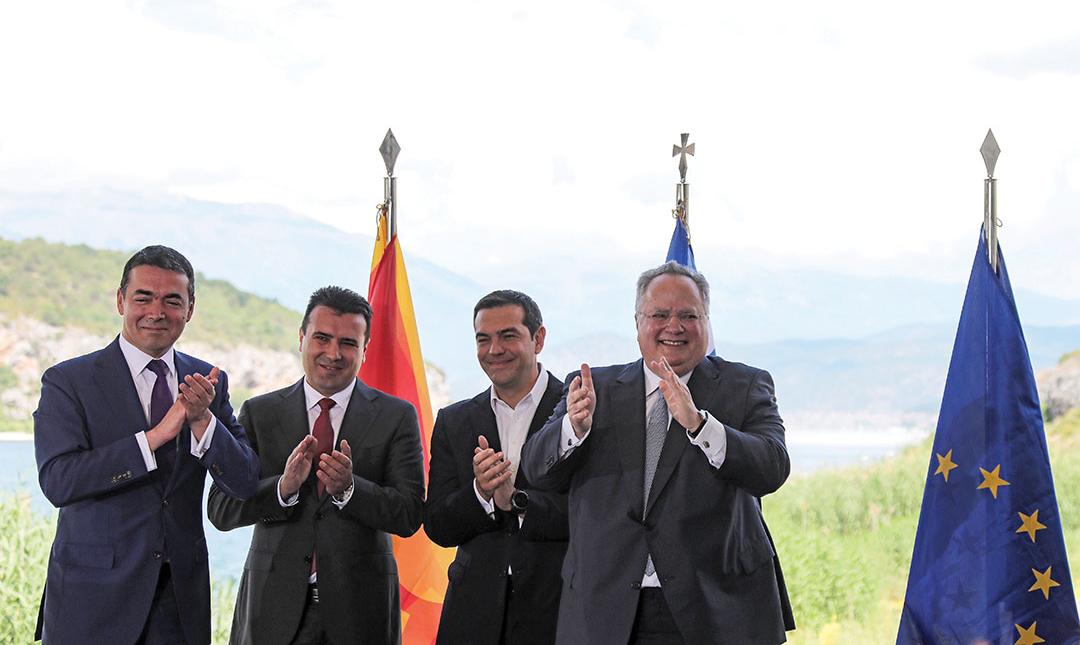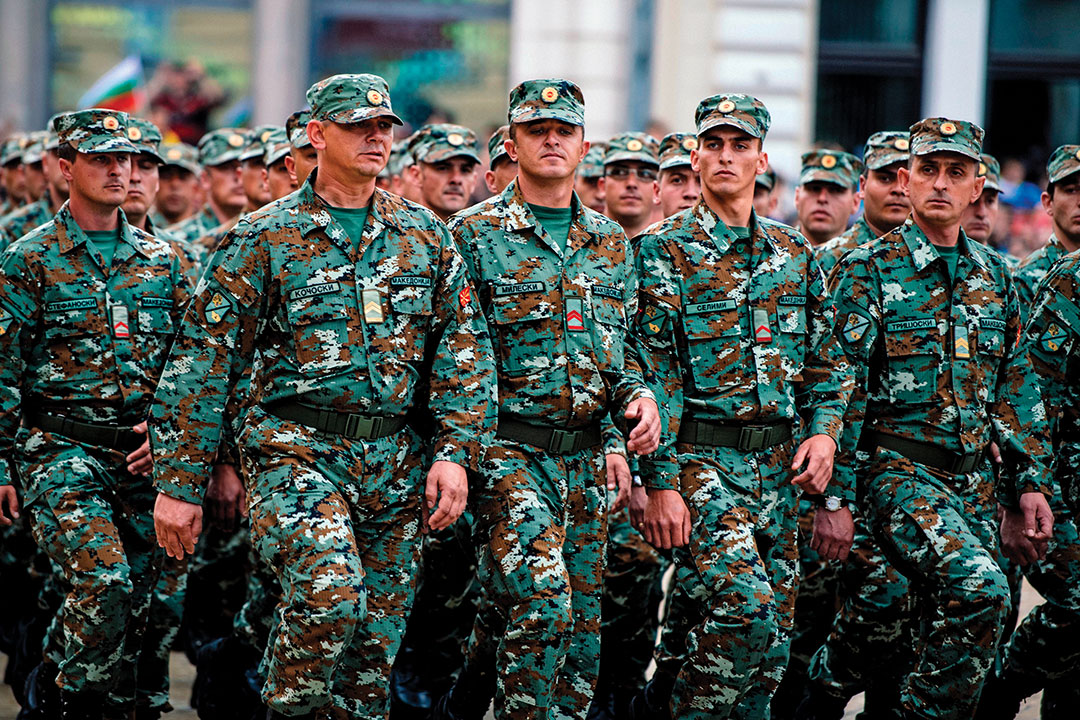North Macedonia and Euro-Atlantic integration
By Slovenian Navy Capt. Gorazd Bartol, former chief of the NATO Liaison Office in Skopje, North Macedonia
Since the 1949 signing of NATO’s founding document, the Washington Treaty, NATO’s purpose has remained the same: Preserve peace. This is done by members pledging to defend one another. NATO members stand together in solidarity, shared purpose and fair burden-sharing.
As a result, NATO’s commitment to the safety and security of all 29 allies is unwavering. At the heart of that commitment is Article 5, NATO’s collective defense clause. An attack on one ally is an attack on all allies. That is the essence of the mutual defense commitment, and it has helped NATO keep the peace in Europe. NATO embodies the unique bond that unites Europe and North America. Our security is indivisible. In a world of global challenges, global solutions and trans-Atlantic cooperation are needed more than ever. The Alliance has been successful these past seven decades because of its ability to adapt to changing security challenges.

Since 2014, the Alliance has agreed on and implemented the most significant reinforcement of our collective defense since the Cold War. Consider:
- The establishment of eight multinational headquarters in the eastern part of the Alliance to link national and NATO forces.
- The tripling in size of the NATO Response Force to 40,000 and establishment of a 5,000-strong, high-readiness task force able to move within days.
- The increased NATO presence in the southeast region of the Alliance.
- The stepped-up air policing over the Baltic Sea and Black Sea and deployment of four multinational battalions to Estonia, Latvia, Lithuania and Poland.
- This was done to prevent conflict, to deter potential aggression and to ensure NATO’s collective defense. After all, NATO is and has always been a defensive alliance.
In addition to ensuring that collective defense, NATO is working to project stability beyond its borders, including through partnerships. At the 2016 Warsaw summit — against the backdrop of an increasingly unstable global security environment and based on a broad and strengthened deterrence and defense posture — NATO leaders agreed to contribute more to projecting stability and strengthening security outside its territory, thereby contributing to overall Alliance security.
Consider the July 2018 meeting of NATO members’ heads of state. Amid speculation that the Alliance is struggling to find its place in the modern world, the allies came together and reinforced why NATO is the most successful military alliance in history. It decided to:
- Raise the readiness of its forces.
- Increase its ability to move them across the Atlantic and within Europe.
- Modernize its command structure.
- Establish a new cyber operations center.
- Boost its contribution to the fight against terrorism through a new training mission in Iraq, more support for Jordan and Tunisia, and a package of additional measures for the south.
- Sustain its presence in Afghanistan until conditions indicate a change is appropriate and extend financing for Afghan security forces through 2024 to help further develop the Special Forces and Air Force as they continue to fight international terrorism.
- Discuss major global security challenges with the presidents of the European Council and European Commission and address challenges in the Middle East and North Africa, the situation on the Korean Peninsula and a more assertive Russia.
- Remain committed to a dual-track approach to Russia: defense and dialogue. Continue to aspire to a constructive relationship when Russia’s actions make that possible.
- And of course, make it clear that NATO’s door remains open by inviting the government in Skopje to begin
accession talks.
NATO embodies the vital bond between Europe and North America. The Alliance guarantees security, freedom and shared values that include a commitment to defend each other. Decisions made at the Brussels summit show that, as the world changes, Europe and North America stand together and act together in NATO.
NATO is the most successful military alliance in history, keeping almost 1 billion citizens across Europe and North America secure and representing half the world’s economic might — and half the world’s military might.
NATO has been engaged in the Western Balkans for more than two decades and is deeply connected to the countries of the region and to its ongoing stability. Albania, Bulgaria, Croatia, Montenegro and Slovenia have joined NATO, and Serbia and Bosnia-Herzegovina are close and valued partners. NATO forces in Kosovo continue to maintain peace and stability. The Alliance wants this region to be secure, prosperous and free. All of North Macedonia’s NATO friends support its accession efforts. But success is not taken for granted.
Politics in the country, and the region, have been challenging. But in Skopje and beyond, considerable progress has been made, particularly in creating a new, more open, more inclusive political culture. Diversity is a strength, not a weakness. Where there is inclusion and open dialogue, supported by good governance, there is resilience. In the Washington Treaty, the allies explicitly stated their commitment to the principles of democracy, individual liberty and the rule of law. Those principles — those ideals — define NATO’s essence. And, increasingly, they define North Macedonia’s. This is why the Alliance welcomes North Macedonia’s commitment to pursuing the path of Euro-Atlantic integration and NATO membership.

NATO has shown that the path to joining the Alliance is still open to countries that are willing and able to meet the responsibilities involved. The Washington Treaty states that allies “may, by unanimous agreement, invite any other European state” to join the Alliance if it is positioned to “further the principles” of the treaty and “contribute to the security of the North Atlantic area.”
Those are the conditions under which, at the 2008 Bucharest summit, NATO decided it would extend an invitation to the Former Yugoslav Republic of Macedonia to join the Alliance as soon as a mutually acceptable solution to the name issue had been reached within the framework of the United Nations. At the NATO summit in Brussels in July 2018, a historic agreement was reached between Athens and Skopje to solve the name issue, and in line with NATO policy, it was decided to invite the government in Skopje to begin accession talks to join the Alliance.
The allies have been impressed by the determination and enthusiasm shown by North Macedonia. While it is good to be ambitious, it is also important to be realistic. There is still much more work to be done. Allies are bound together not just by common interests but by common values, and countries wishing to join the Alliance must demonstrate that they share those values. That means sticking to the path of reform. NATO will be with you every step of the way.

There has been important progress on key areas of reform — for instance on transparency, accountability, oversight of the intelligence and security agencies, and judicial reform. And that must continue. The roles of government, Parliament and the opposition are crucial: Each bears a responsibility to the people they represent. Civil society also has a critical role to play. And every single citizen has a contribution to make, no matter where or which community they come from.
Good relations with neighbors are imperative. NATO has welcomed the signing of the Prespa Agreement, and also welcomed the ratification of the Treaty of Friendship with Bulgaria. The Alliance will continue to encourage the improvement of relations with others in the region.
For more than 15 years, the brave men and women of North Macedonia’s highly skilled Armed Forces have participated in allied missions in Kosovo, Afghanistan and other locations. They have helped to bring security and stability and helped the people there to dream of a brighter future. NATO appreciates all the contributions made in support of international security, and North Macedonia’s citizens should be proud.
NATO will continue to provide practical support for defense reforms, help improve defense education and increase transparency in the defense sector. The Alliance welcomes the continuing reform of national defense institutions and looks forward to seeing the fruits of the Strategic Defense Review.
But it is also crucial for NATO to see Skopje investing in defense. NATO is a military alliance whose chief purpose is collective defense fused by a solemn commitment to come to each other’s aid. All NATO allies have committed to increase defense spending to 2 percent of gross domestic product. The Alliance wants to see North Macedonia moving in the same direction and commends the government’s commitment to meeting the 2 percent target. NATO also wants to see efforts to boost the ability of its militaries to work together on operations; security is the bedrock of prosperity and economic opportunity. Since Montenegro joined NATO in 2017, foreign investment from allied countries has doubled.
Finally, let me reiterate: NATO membership will give this great country an equal voice in discussions, an equal vote in decisions, and the security that comes with being part of the world’s most successful military alliance. It means having 29 other countries committed to protect and defend North Macedonia and its national sovereignty against any aggressor. This is a once-in-a-lifetime opportunity to become a full member of the international community with all the benefits that this brings. ο


Comments are closed.